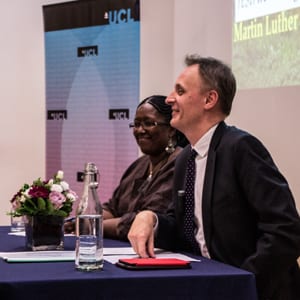UCL-Lancet Lecture 2013 – Charity does not rhyme with sustainability
By news editor, on 13 November 2013
![]() Written by Sujitha Selvarajah, a third year medical student, currently doing an intercalated BSc in Global Health.
Written by Sujitha Selvarajah, a third year medical student, currently doing an intercalated BSc in Global Health.
“My target is not my grandchild, my target is the child of the poorest woman in Rwanda,” said Rwanda’s Minister of Health, Dr Agnes Binagwaho at the 2013 Lancet Lecture on 6 November.
Less than 20 years ago, the Rwandan Genocide saw 10 percent of the population wiped out in 100 days. Since then, life expectancy has trebled with more than a million Rwandans no longer living in poverty.
Dr Binagwaho credits five principles as the pillars underpinning Rwanda’s ‘miracle’:
1. Ownership
2. Equity
3. Science
4. Participation
5. Sustainability
Ownership
Dr Binagwaho emphasised the importance of each country taking ownership. She criticised that the consequence of decisions not being made in the capitals of aid-receiving countries was a mismatch between the areas of aid necessity and aid delivery.
She then urged us to come together and within one framework – thereby overcoming the problems of fragmented and, hence, ineffective aid efforts. She echoed the sentiments of the Rwandan President; “the Millenium Development Goals are the floor, not the ceiling”.
Equity
Dr Binagwaho credits the spread of access to opportunities among the rich and poor as one of the key drivers behind Rwanda’s success. By targeting the “child of the poorest woman in Rwanda”, she is tackling the issues of the most vulnerable within her community, and when you do this, “the rest will follow”.
Such a specific approach has had the desired widespread effect. Despite there only being 600 doctors among Rwanda’s 11 million population, it has a higher percentage of free healthcare coverage than the USA. The rest clearly did follow.
Science
She stressed the importance of Ministry of Health workers undertaking PhDs and MScs in order to understand the practice of evidence-based medicine (EBM). By encouraging and enabling the MoH workers to study while working, “you are helping them where they are,” she added.
Dr Binagwaho demonstrated the impact of EBM when explaining that the entire cohort of 11-year-old girls were enrolled onto a Human Papillomavirus Virus (HPV) vaccination scheme with a 93% compliance rate for all three courses of the vaccine, after research showed that sexual intercourse did not start on average until the age of 11 among girls.
She stressed the role of EBM in directing resources to where it was most needed and claimed that if such an approach were adopted globally, then the focus would be on saving newborns.
The role of science in Rwanda’s post-genocide transformation is two-fold. EBM is only one half of it. The second part lies in the role of technology, specifically the increased coordination among health care workers through the use of mobile phones.
Each village has at least three mobile phones, which are dedicated solely to health purposes, and the success of such a system was proven when a cholera crisis was averted by the use of a centralised SMS network.
Participation
The local communities are involved in various ways. Community Health Workers, for example, with basic literacy skills, are elected by their local communities.
Such an approach would have increased the ‘acceptability’ of health services within local villages: if the people have elected their health workers, they are more likely to use their services.
This increased involvement of the community leads to increased accountability of the service providers. Take for example, National Dialogue Day in Rwanda, whereby any member of the public can ask cabinet ministers, the Prime Minister and the President anything via SMS and telephone.
Such empowering levels of public involvement hold the decision makers accountable to the people that they serve. Dr Binagwaho spoke of the importance of explaining the reasoning behind every implemented measure.
She referred to the cultural revolution that happened alongside the Prevention of Mother to Child HIV Transmission programme: “Men for the first time in Africa were concerned with a child that was not even born.” This demonstrates just how powerful public involvement can be.
Sustainability
“Charity does not rhyme with development because charity does not rhyme with sustainability.” This was undoubtedly the resounding message of the evening.
Dr Binagwaho ended on the words of Martin Luther King, which embody this ideology perfectly: “True compassion means more than flinging a coin to a beggar, it comes to see that an edifice that produces beggars needs structuring.”
A systems approach is the solution. Dr Agnes Binagwaho spoke of ‘reverse innovation,’ whereby US universities are helping to educate the Rwandan public and NGOs are “helping people to create their own country”.
If changes are not made at the grassroots level across different disciplines, then when the aid runs dry, the progress stagnates. Aid that focuses on feeding people today, without giving them the capacity to eat tomorrow is ineffective.
Finally, attention needs to be drawn to what was not explicitly highlighted by Binagwaho. Feminists across the world are calling for equality across every discipline including politics and management.
With a female majority in parliament, this is a goal that Rwanda has indisputably reached. While Rwanda leads the way in this aspect, it is not alone, with the Malawian and Liberian heads of state being female and Senegal recently having elected a female Prime Minister.
There is a lot to be learned from Sub-Saharan African countries such as Rwanda. In the words of Dr Richard Horton, Editor-in-Chief of the Lancet, Dr Binagwaho is “so much more than a Minister of Health.” She is a driving force for change, paving the way for the next generation who need to “know that you can do the revolution”.
Watch the full lecture below:
 Close
Close


